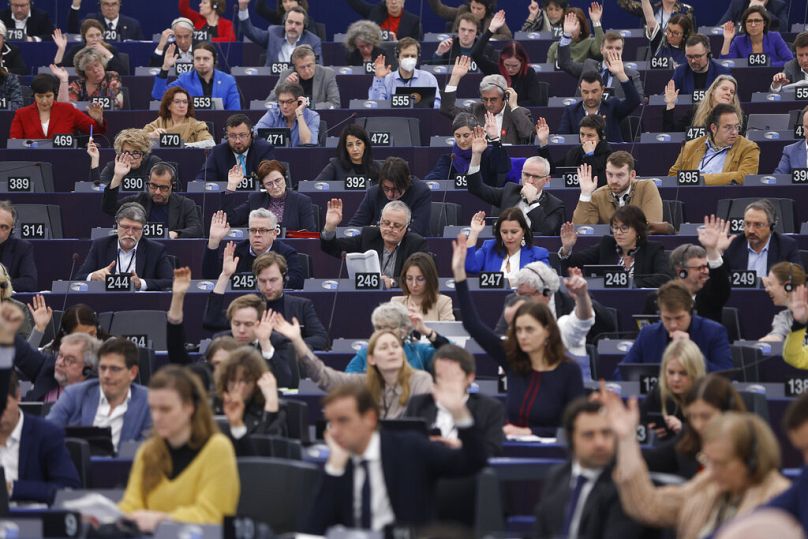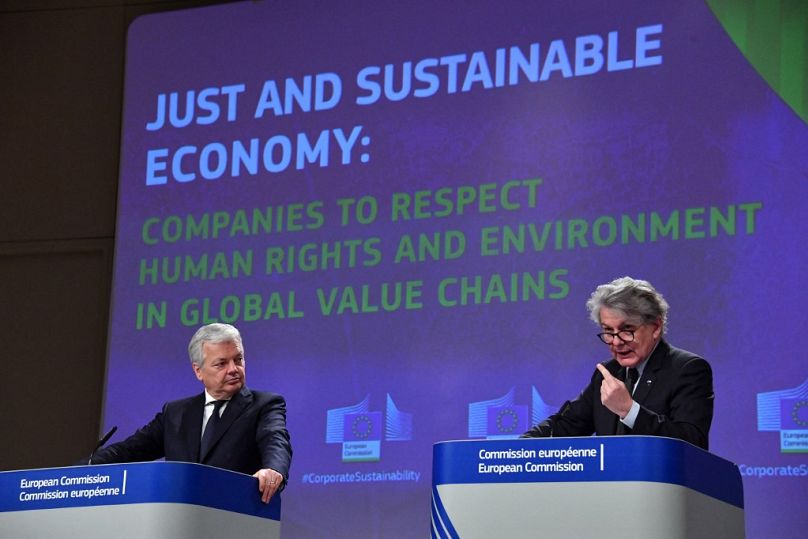MEPs are set to decide how to include the financial sector in the corporate due diligence directive on 1 June. Their decision could either strengthen or distort the European financial market and enable corporate abuses of people and the planet, Uku Lilleväli writes.
If the years since the financial crash have taught us anything, it’s that the market is far from perfect.
Time has shown us that financial models that overlook sustainability issues expose financial institutions' portfolios to immediate and long-term vulnerabilities.
But despite growing demands for more transparency on sustainability, the EU lacks clear guidance for financial institutions not just to report on but actually manage sustainability impacts and risks in their portfolios.
The Corporate Sustainability Due Diligence Directive can provide the financial sector with a clear legal framework to address these issues and pave the way for a more robust and resilient economy.
From legal fragmentation to market distortion
So far, EU legislators have mostly intended to limit the financial sector's role in the Directive, which not only undermines the legislation’s goal of tackling corporate abuse but also reinforces legal fragmentation between member states.
For example, the European Council's decision to allow members to individually decide whether to regulate financial services — like lending and insurance — increases legal uncertainty and creates a heavier administrative burden for cross-border financing and business.
This would imperil the harmonisation of future sustainability due diligence laws, a key objective of the Directive that even the most conservative groups in the European Parliament have supported.
But there is more: financial services and instruments are put on an unequal footing.
The European Commission and the European Council are proposing to exempt asset managers and investors and limit mandatory due diligence obligations to financial services only, giving a free pass to investments and financial products.
The European Parliament is edging closer to the final plenary vote that could change the course and ensure that investee companies and funds are not overlooked.
But for this, MEPs can’t deviate from the compromise deal that has been carefully crafted with wide support from all key EU groups, considering the thorough discussions in the parliamentary committees.
Exceptions for some make it unjust to others
Making an exception for investments and asset managers makes it unjust for other financial services and institutions.
What’s more, it also fails to incentivise them to identify and address sustainability risks.
Ironically, a vast part of institutional players, such as equity investors, would especially be best equipped to engage with the companies whose shares they own.
They should have the responsibility for both the companies' negative impacts on the environment and for creating incentives for the management to improve the company’s sustainability performance.
Such exceptions make it uneven also for companies on the receiving end.
Although SMEs are exempt, businesses in economies with underdeveloped capital markets that struggle to secure equity investments and rely on credit would be disproportionately more affected than their peers.
To add more insult to injury, the European Commission and the European Council have also created blind spots for the financial sector as they have asked financial firms to conduct sustainability due diligence only once before the financing decision.
This allows them to overlook grave financial, physical and reputational risks that can arise throughout the financing cycle.
Similarly to how banks need to know of any substantial changes in the credit profile of the mortgage holder or credited company, effective risk management requires an understanding of the relevant sustainability risks and harms that occur in the portfolios.
Full financial sector inclusion is proportionate, workable and necessary
Many investor groups like Eurosif, Principles for Responsible Investment and Institutional Investors Group on Climate Change have emphasised that requiring the entire financial sector, including asset managers and institutional investors, to conduct sustainability due diligence is proportionate, workable and necessary to manage sustainability risks, impacts and opportunities.
Following a risk-based approach, all financial institutions would have to prioritise risks and impacts most relevant to their business model, mandate and portfolios, thus not putting a disproportionate burden on financial firms or omitting others.
Mandatory sustainability due diligence for all financial institutions, services and instruments would not only signal the need to address sustainability issues in the wider economy but also allow financial institutions to be more resilient and safeguard their long-term financial stability.
It is crucial that MEPs support the entire compromise deal, which includes due diligence obligations for the entire financial sector.
This is the only way to support the fair play of market forces and incentivise the financial sector as a whole to manage sustainability impacts and risks.
Uku Lilleväli serves as Sustainable Finance Policy Officer at WWF European Policy Office.
At Euronews, we believe all views matter. Contact us at view@euronews.com to send pitches or submissions and be part of the conversation.



